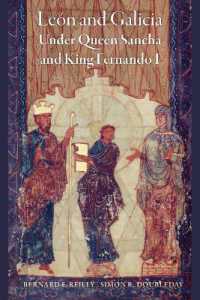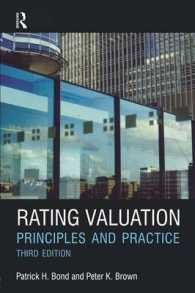- ホーム
- > 洋書
- > 英文書
- > Religion / Ethics
Full Description
Drawing on the thought of Durkheim, this volume focuses on societal changes at the symbolic level to develop a new conceptualisation of the emergence of postsecular societies. Neo-Durkheimian categories are applied to the case of Turkey, which in recent years has shifted from a strong Republican and Kemalist view of secularism to a more Anglo-Saxon perspective. Turkish society thus constitutes an interesting case that blurs modernist distinctions between the secular and the religious and which could be described as 'postsecular'. Presenting three symbolic case studies - the enduring image of the founder of the Republic Atatürk, the contested site of Ayasofia, and the remembering and commemoration of the murdered journalist Hrant Dink - The Making of a Postsecular Society analyses the cultural relationship that the modern Republic has always had with Europe, considering the possible implications of the Turkish model of secularism for a specifically European self-understanding of modernity. Based on a rigorous construction of theoretical categories and on a close scrutiny of the common challenges confronting Europe and its Turkish neighbour long considered 'other' with regard to the accommodation of religious difference, this book sheds light on the possibilities for Europe to find new ways of arranging the relationship between the secular and the religious. As such, it will appeal to scholars of social theory, the sociology of religion, secularisation and religious difference, and social change.
Contents
Contents: Foreword, Alessandro Ferrara; Preface; Introduction: new centres, new stories. Part I A Sociological Theory of Postsecular Society: Centre and periphery: social symbolic morphology; Clarifying the postsecular: a sociological reading; Postsecular sanctuaries and the centre: the sacredness of sacred places; Memory, trauma and the work of rituals: the dynamics of symbols. Part II The Turkish Laboratory: Centre and periphery in the history of Republican Turkey: a symbolic analysis; From a secular to a postsecular and post-Kemalist Turkey? The neo-Ottoman (democratic) narrative and the reconstruction of the Turkish central value system; Mustafa Kemal Atatürk: an old symbol in transformation; Turning religious differences into a museum: Aya Sofya; When the water finds its crack: Hrant Dink at the crossroads of contemporary Turkey; Modernities and religions: the four quadrant model; Conclusion: Habap and the water that came from heaven; Appendix: Durkheim in Turkey;








